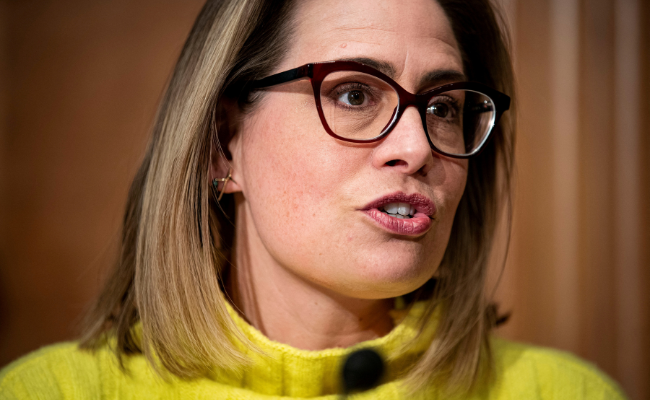Kyrsten Sinema leaves Democratic Party, shaking up US Senate margin
Maverick U.S. Senator Kyrsten Sinema of Arizona is leaving the Democratic Party to become an independent, she said on Friday, just days after Democrats won a Senate race in Georgia and secured 51 seats in the 100-member chamber riven by deep political divisions.
“Like a lot of Arizonans, I have never fit perfectly in either national party,” Sinema said in an article for the Arizona Republic newspaper.
Sinema intends to maintain her committee assignments from the Democrats. An aide told Reuters on condition of anonymity. The aide would not say whether Sinema would continue to caucus with Democrats.
However, Sinema said she would not caucus with the Republican Party, according to an interview published by Politico on Friday. If that holds, Democrats could maintain greater governing control in the closely divided chamber.
Sinema’s bombshell came as the future of Democratic President Joe Biden’s agenda in the second half of his four-year term was already clouded by Republicans who are set to take majority control of the House of Representatives on Jan. 3 as a result of the Nov. 8 midterm elections.

Senator Kyrsten Sinema, a Democrat from Arizona, speaks during a Senate Homeland Security and Governmental Affairs Committee confirmation hearing for Shalanda Young, director of the Office of Management and Budget (OMB) nominee for U.S. President Joe Biden, in Washington, D.C., U.S., February 1, 2022. Al Drago/Pool via REUTERS/File Photo
With its strong conservative bent, House Republicans have already told Biden that they will seek deep domestic spending cuts and more robust border security steps. It will be up to Senate Democrats to defend Biden and act as a guardrail against Republican initiatives.
Sinema’s statements so far indicate she will continue working in the independent-minded way she demonstrated over the past two years: collaborating with Democrats and Republicans to enact legislation while unafraid of throwing up roadblocks that frustrate the White House and Senate Majority Leader Chuck Schumer.
Aides to Schumer and Senate Republican Leader Mitch McConnell were not immediately available for comment.
With her new status as an independent, Sinema has cemented her role in the Senate as a maverick, much like the late Republican Senator John McCain was. Arizona has a legacy of trailblazing senators, including Republican Barry Goldwater, who served in the 1950s and 1960s and brought new life to the U.S. conservative political movement, only to suffer a resounding defeat when he ran for president in 1964 against Democrat Lyndon Johnson.
Sinema has two years left in her six-year Senate term and would be up for re-election in 2024 if she decides to seek another term. If so, it was unclear whether Democrats would mount a challenge.
There has been speculation that Democratic U.S. Representative Ruben Gallego could seek the seat.
Sinema and Democratic Senator Joe Manchin have kept Washington in suspense over the last two years as they have repeatedly withheld their needed votes for legislative initiatives sought by Biden.
Almost one year ago, Sinema and Manchin killed an attempt by Senate Democrats to lift the chamber’s “filibuster” rule, which requires the support of a supermajority of 60 votes for most legislation to advance toward passage.
That stymied Democrats’ push, supported by Biden, for significant voting rights reforms.
While supporting such legislation, Sinema added, “I will not support separate actions that worsen the underlying disease of division infecting our country.”
With her close ties to the U.S. pharmaceutical industry, Sinema has stood in the way of some legislation giving the government the power to negotiate lower prescription drug prices for Medicare patients. However, she backed a more narrow effort earlier this year.
On tax policy, Sinema is more in line with Republicans, as she opposes Biden’s moves to raise taxes on the wealthy and corporations.
At the same time, Sinema and Manchin have worked bipartisanly on high-profile bills that have become law, including a major bill that will invest huge sums of federal dollars to combat climate change. This week, Sinema and Republican Senator Thom Tillis unveiled an immigration reform plan that is getting attention in the Senate.
In the Arizona Republic article, Sinema described her disillusionment with what she described as a rigid two-party system that encourages partisanship over independence.
“I have joined the growing numbers of Arizonans who reject party politics by declaring my independence from the broken partisan system in Washington. I registered as an Arizona independent,” Sinema wrote.
Read More
2019, Sinema telegraphed her independent streak, often wearing fashionable, brightly colored clothing amid a sea of men clad in button-down shirts, striped ties, and drab suits.
Democrats had held the Senate with a 50-50 majority, as Vice President Kamala Harris has the power to cast tie-breaking votes. U.S. Senator Raphael Warnock’s victory in Tuesday’s runoff election in Georgia had handed them their 51st seat.
Two other senators – Bernie Sanders of Vermont and Angus King of Maine – are registered independents but caucus with Democrats.
Sinema on Friday said her shift came as a growing number of people in her Western state were also declaring themselves politically independent, rejecting both the Republican and Democratic political labels.
“We don’t line up to do what we’re told, automatically subscribe to whatever positions the national political parties dictate, or view every issue through labels that divide us,” she wrote.

